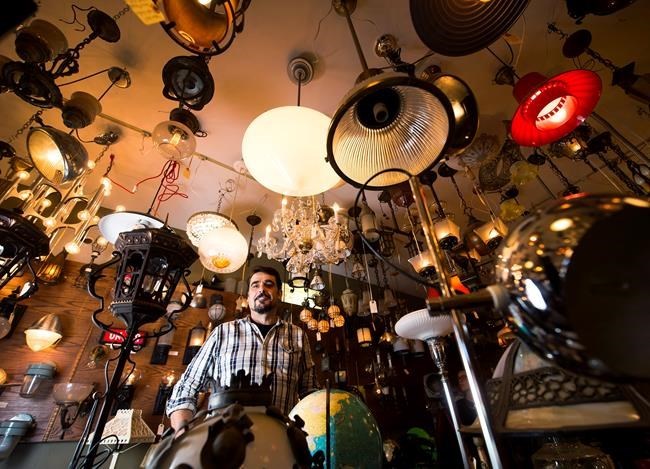
Pete Breese, owner of Eclectic Revival Vintage & Custom Lighting poses for a photograph in Toronto Wednesday November 9, 2016. THE CANADIAN PRESS/Nathan Denette
November 10, 2016 - 6:00 AM
TORONTO - Pete Breese remembers seeing a leather jacket he wanted to buy — but not pay full price for — in a store when he was a teenager, so he asked for a discount and walked away with his new purchase shortly after.
"Ever since then, I realized that you can haggle just about anywhere," he said — and he's continued to do it "all the time."
It may seem like haggling is confined to car dealerships, Kijiji sales and travels abroad, but that doesn't have to be the case. Few prices are non-negotiable, say seasoned hagglers, and people shouldn't fear asking for a discount most anywhere so long as they follow the proper bargaining etiquette.
"There's always room," says Mohammed Halabi, director and founder of MyBillsAreHigh.com, which negotiates down the cost of individual and business phone, Internet and TV plans.
The only exceptions, he quips, are gas and hydro bills.
All other companies — like furniture retailers, hotels or electronics dealers — are fair game, he says.
"There's room for those places to, you know, either sweeten up the deal or get a reduction in cost," says Halabi. Instead of a price cut, consumers could ask a hotel for a free upgrade or petition a telecom provider to add in more data without an extra fee.
To secure any deal though, a customer must first ask and there are some ways to help ensure that goes smoothly.
The best way for someone browsing to start a negotiation is to mention how much they love an item, says Breese, who now owns Eclectic Revival, a vintage and custom lighting store in Toronto, where it's acceptable to bargain rather than just pay what's scrawled on the price tags.
"When I see somebody being enthusiastic about a piece (it) is definitely going to soften my heart," he says.
A polite demeanour is also a must. Recently, Breese stopped engaging with a man who repeatedly demanded he sell an item for $100 less than its price after he had already said the most he was willing to drop it by was $75.
On the flip side, trying to bring down the price by pointing out flaws on an antique is likely to backfire, he says, because it could offend the seller, who is likely aware of any nicks already.
It's also important to be knowledgeable, says Halabi, who believes his years of experience selling services on behalf of telecom providers give him an edge in securing the best deal.
If shoppers don't see any success from speaking to a salesperson, Halabi suggests escalating the matter by requesting to speak to a manager, who may have more leeway.
Customers must also be reasonable about what they're asking for.
"Rule of thumb is ... try not to cut somebody in half," says Breese, adding it's acceptable to start by asking for a 20 to 30 per cent discount.
But not everyone wants to start a negotiation and anxiety around haggling is common.
A recent survey commissioned by AutoTrader.ca found nearly one out of five respondents said they were holding off from purchasing a vehicle because they feared negotiating over price.
Breese says there's little reason to feel nervous about haggling — a conversation that typically takes only a few minutes in his shop.
"The worst thing they can say is no."
Follow @AleksSagan on Twitter.
News from © The Canadian Press, 2016